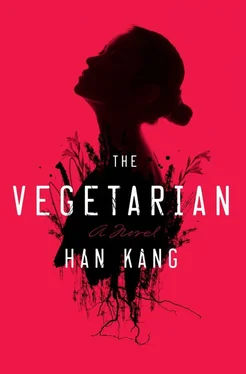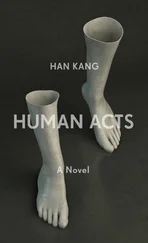Once she was out of danger, he’d used the money her husband had given him to go to a shop and buy a new shirt to change into. Instead of throwing away his soiled shirt, which stank of blood, he’d bundled it up into a ball and taken it with him in the taxi home. During the journey, his most recent video work had come to mind, and he’d been surprised to find himself recalling it as something that had caused him unbearable pain. The work was based around images related to things he loathed and thought of as lies, edited together into an impressionistic montage with music and graphic subtitles: ads, clips from the news and television dramas, politicians’ faces, ruined bridges and department stores, vagrants, and the tears of children who suffered from incurable diseases.
He had felt suddenly sick. Even though those images had undeniably caused him agony, even though he’d hated them, the individual moments contained in the work, which he’d stayed up all night wrestling with, struggling to face up to the true nature of the emotions they provoked in him, had now come to feel like a form of violence. At that moment his thoughts crossed a boundary, and he wanted to fling open the door of the speeding taxi and tumble out onto the tarmac. He could no longer bear the thought of those images, of the reality they portrayed. Back then, when he had been able to deal with them, it must have been because his hatred of them was somehow underdeveloped — or else because he hadn’t been sufficiently threatened by them. But just then, shut up inside the taxi that sweltering summer afternoon with the smell of his sister-in-law’s blood assailing his nostrils, those images and that reality were suddenly threatening, making the bile rise in his throat and the breath catch in his lungs. It occurred to him that it might be a long time before he was capable of making another work. He was worn out, and life revolted him. He couldn’t cope with all these things it contaminated.
The past ten or so years’ worth of work was quietly turning its back on him. It wasn’t his anymore. It belonged to a person he used to know, or thought he’d known — once upon a time.
—
His sister-in-law was silent on the other end of the phone. He knew she was there, though; he could hear a faint sighing sound, like breathing, overlaid with a kind of rattling that he guessed was coming from the line.
“Hello?” He was finding it difficult to force the words out. “Sister-in-law, it’s me. Ji-woo’s mum is…” He despised himself, all his hypocrisy and trickery, but fought this down and continued speaking. “Well, she’s worried, you know.”
Still no answer. He sighed into the receiver. She would be standing there barefoot, he knew, like always. When her time at the psychiatric hospital, where she’d spent several months, had come to a close, she’d come to stay with them while his wife and the rest of the family all went to try to persuade her husband to take her back. The month she’d spent with them, before moving out into a rented studio apartment, had caused none of them even the slightest strain. Partly this was because he had yet to hear about the Mongolian mark, and thus regarded her as nothing more than an object of pity, albeit a faintly inscrutable one.
She’d never been much of a talker, and had spent the majority of her time out on their veranda, sunning herself in the late-autumn sunshine. She would occupy herself in picking up the dried leaves that had fallen from the flowerpots and crumbling them into a fine powder, or in stretching out the palm of her hand to cast shadows over the floor. When his wife was busy with something she would lend a hand with Ji-woo, taking him to the bathroom and helping him wash, her bare feet kissing the cold tiles.
It was difficult to believe that such a woman had once tried to kill herself, or that she’d sat topless in front of a crowd of strangers, perfectly composed, which had apparently been a symptom of some kind of post-suicide-attempt dementia. That he had run to the hospital with her bleeding on his back, and that the experience had had such a profound effect on him, seemed like something that had happened with a different woman, or perhaps in a different time.
The only thing that was especially unusual about her was that she didn’t eat meat. This had been a source of friction with her family from the start, and since her behavior after this initial change had grown increasingly strange — culminating in her wandering around topless — her husband had decided that her vegetarianism was proof that she would never be “normal” again.
“She was always so submissive — outwardly, at any rate. And for a woman who wasn’t quite all there to start with to be taking medication every day, well, she’s bound to get worse, and that’s all there is to it.”
What threw him was the way that his brother-in-law seemed to consider it perfectly natural to discard his wife as though she were a broken watch or household appliance.
“Now don’t go making me out to be some kind of villain. Anyone can see that I’m the real victim here.”
Unable to deny that there was at least a measure of truth in this, he, unlike his wife, kept a neutral position on the matter. She, on the other hand, begged Mr. Cheong to hold off on the formal divorce proceedings and wait to see how things would pan out, but he remained unmoved.
He made an effort to push Mr. Cheong’s face out of his mind, that narrow forehead, pointed jaw and general look of stubbornness which he’d always found unpleasant. He tried speaking Yeong-hye’s name again.
“Answer me, sister-in-law. Whatever you say, just answer.” Just as he thought there was nothing else for it but to hang up, she spoke.
“The water’s boiling.” Her voice had no weight to it, like feathers. It was neither gloomy nor absentminded, as might be expected of someone who was ill. But it wasn’t bright or light-hearted either. It was the quiet tone of a person who didn’t belong anywhere, someone who had passed into a border area between states of being.
“I’ll have to go and turn it off.”
“Sister-in-law, I…” He spoke hurriedly, panicking that she might put the phone down and cut him off. “Is it okay if I come over now? You aren’t going out anywhere today?”
After a brief silence, he heard a click and the tone which signaled that the call had been ended. He put down the phone, his hand slick with sweat.
—
It was clearly only after hearing about her Mongolian mark from his wife that he’d started to see his sister-in-law in a new light. Before that, he’d never had any kind of ulterior motive when it came to his dealings with her. When he recalled how she’d looked and acted during the time she’d spent living with them, the sexual desire that flooded through him was a product of his mental re-enactment of these past experiences, not something he’d actually felt at the time. He felt his skin grow heated every time he called to mind her absentminded expression as she sat on the veranda throwing out shadows with her hand, the flash of white ankle that her baggy tracksuit bottoms had revealed while she was helping his son to wash, the nonchalant line of her body as she’d sat sprawled in front of the television, her half-naked legs, her disheveled hair. And stamped over all these memories was the blue Mongolian mark — that mark which appeared on the buttocks or backs of children, usually fading away long before adulthood.
Now, the fact that she didn’t eat meat, only vegetables and cereal grains, seemed to fit with the image of that blue petal-like mark, so much so that the one could not be disentangled from the other, and the fact that the blood that had gushed out of her artery had soaked his white shirt, drying into the dark, matte burgundy of red bean soup, felt like a shocking, indecipherable premonition of his own eventual fate.
Читать дальше












